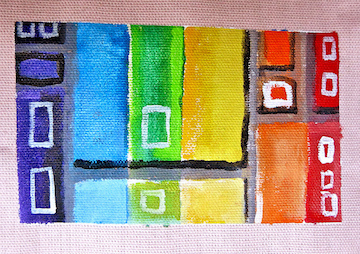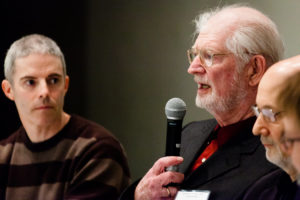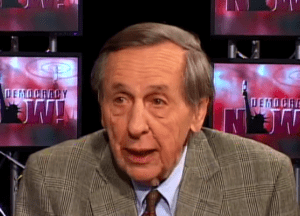Queerness and the Next System: Opening Up the Discussion
For centuries, the erasure of LGBTQ people from public policy has been the norm, but discussions about the economic future cannot sideline conversations around gender, sex and sexuality. torbakhopper / CC BY-ND 2.0
1
2
3
4
5
torbakhopper / CC BY-ND 2.0
1
2
3
4
5
Aside from its strictly political interpretations, however, “queer” retains a clear artistic, or rather, stylistic dimension as well. For many queer people, their membership in gender and sexual minority communities constitutes the lens through which they’ve developed more encompassing political, economic, and social critiques. Their efforts to define themselves in ways that seem authentic — regardless of whether those ways elude straight society — is a testament to their creativity and commitment to imagining new ways of existing in the world. Queer people often believe that expressions of gender and sexuality are fluid, ever-changing, and that they ought to be free to self-determine the ways they exist in the world, regardless of society’s expectations. Their refusal to allow their sexual orientation, gender identity, or gender expression to become the sole means through which they engage in activism has found purchase in the multiracial, socio-economically diverse queer community.
As CJ Cohen argues, “queer theory stands in direct contrast to the normalizing tendencies of hegemonic sexuality rooted in ideas of static, stable sexual identities and behavior.” It’s by resisting efforts to “be known” through categorization, classification, or assimilation that queer movements came to serve a vital purpose for the Left and all movements seeking collective liberation: the holders of spaces of possibility which envisioned worlds free of cis-heteropatriarchy, hierarchy, and — in many cases — capitalism. (What queerness should not be understood to do is to create space for solely individual rather than collective expression of autonomy, human flourishing, and political possibility. In “Sacrificing Queers and Other ‘Proletarian’ Artifacts,” Robin Podolsky discusses how conventional Leftists have thrown up their hands at queerness as “self-indulgent distractions from struggle” plagued by “bourgeois decadence,” instead of marginalized communities with a unique approach to social change.)
The revolutionary personal and collective potential of queerness for connected movements for transformational change has yet to be sufficiently explored. Yet, its relevance continues to be underscored. As queer theorist Michael Warner writes, the experience of coming to terms with a queer identity requires an individual to re-invent one’s relationships to a series of institutions that structure human lives, thereby making claims on the power structures that govern one’s life:
SUPPORT TRUTHDIG
Every person who comes to a queer self-understanding knows in one way or another that her stigmatization is connected with gender, the family, notions of individual freedom, the state, public speech, consumption and desire, nature and culture, maturation, reproductive politics, racial and national fantasy, class identity, truth and trust, censorship, intimate life and social display, terror and violence, health care, and deep cultural norms about the bearing of the body. Being queer means fighting about these issues all the time, locally and piecemeal but always with consequences. It means being able, more or less articulately, to challenge the common understanding of what gender difference means, or what the state is for, or what “health” entails, or what would define fairness, or what a good relation to the planet’s environment would be. Queers do a kind of practical social reflection just in finding ways of being queer.Warner’s description of queer self-awareness bears quoting in its entirety not because of its exhaustive list of the ways queers must resist co-optation and dominance but in its more subtle conclusion that queer people, acknowledging their contested identity, do the daily work of making these spaces whole, of crafting their own paths through and around institutions that exist to exclude them, and in so doing create ways of living in the world that open up the possibilities for others. The fact that heterosexism can be found or implied so universally across our shared patrimony shows that the experience of living a queer life in a queer body necessitates a daily reimagination of the world not just at the abstract, structural level but in terms of immediate, individual experiences. It’s that negotiation of power dynamics both internal to a queer person and external to the world which I believe makes a queer framework instructive for and essential to the visionary, dynamic work of imagining the “next system.” Erik Lampmann is queer writer, facilitator, and organizer based in Washington, DC. He’s completed grant-funded research on deliberative democracy, spent time at UC Berkeley’s Haas Institute for a Fair and Inclusive Society, and organized for LGBTQIA liberation in Richmond, Virginia. His writing can be found at The Nation, TruthOut, The Indypendent, and The NextNewDeal. Your support matters…
Independent journalism is under threat and overshadowed by heavily funded mainstream media.
You can help level the playing field. Become a member.
Your tax-deductible contribution keeps us digging beneath the headlines to give you thought-provoking, investigative reporting and analysis that unearths what's really happening- without compromise.
Give today to support our courageous, independent journalists.






You need to be a supporter to comment.
There are currently no responses to this article.
Be the first to respond.